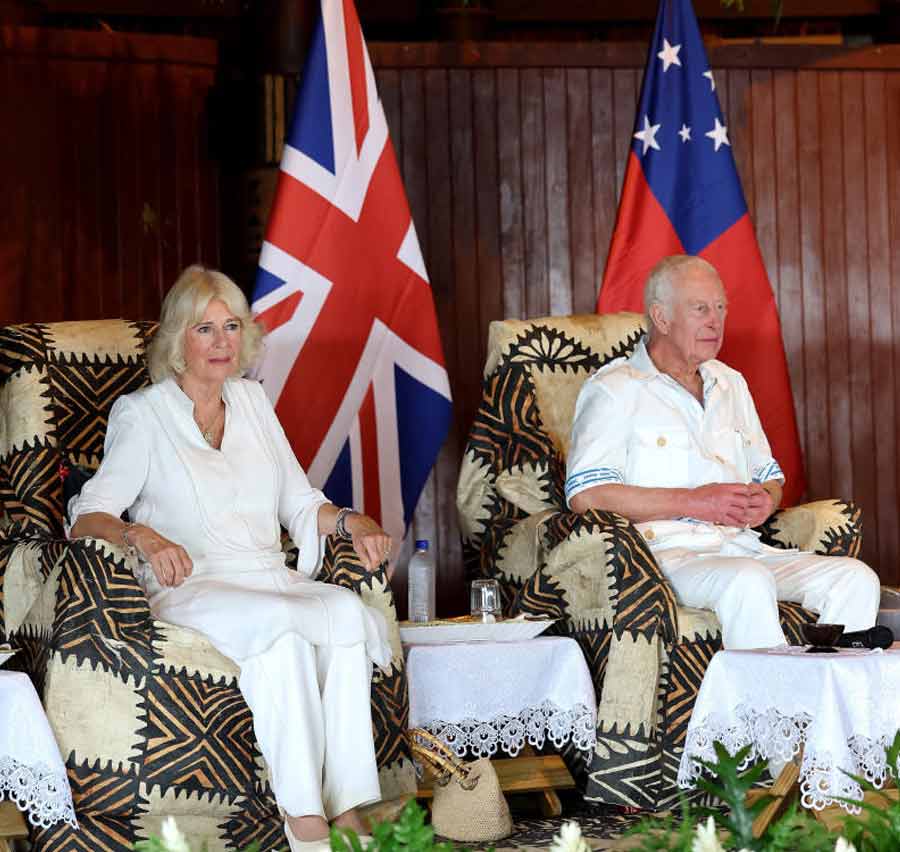 Wednesday, 22 January 2025
Wednesday, 22 January 2025
 Wednesday, 22 January 2025
Wednesday, 22 January 2025

A blistering row has ignited about whether the UK should pay reparations to its former colonies for slavery or whether it is owed a debt of gratitude for taking the rule of law and democracy to the most far-flung corners of its former empire.
The battle erupted at the Commonwealth Heads of Government meeting in Samoa when the former colonies turned the tables on their one-time overlord, Britain by demanding reparations for colonial rule and slavery.
First to leap into fray to defend Britain after the meeting was the outspoken former prime minister Boris Johnson who denounced the notion that Britain owed reparations for the Age of Empire. He also slammed Prime Minister Keir Starmer for not rejecting these demands more forcefully.
Johnson, who has previously backed the Wuhan ‘lab-leak’ theory, argued that China owed the world reparations as he considers it was responsible for Covid-19. “China gets away scot-free over Covid… but we face bizarre demands for slavery reparations because Starmer's foreign policy is about as robust as a tea-dunked hobnob (a biscuit),” Johnson expostulated in a Daily Mail column.
Robert Jenrick, a Conservative politician currently vying for his party’s leadership, joined Johnson in opposing reparations demands, citing the many benefits British colonialism supposedly brought to those people who lived under its rule.
Also writing in the Daily Mail, Jenrick argued that the British Empire left behind a valuable legacy and that its former colonies should actually be grateful.
“I'm not ashamed of our history. It may not feel like it, but many of our former colonies – amid the complex realities of Empire – owe us a debt of gratitude for the inheritance we left them,” he claimed.
Jenrick slammed domestic critics of the Empire, insisting that, “The malign idea that Britain's history is one of crime and shame is gaining currency in our national conversation.”
Taking aim at left-winger detractors of the British Empire, he added: “Our elites uniquely practise what philosopher Roger Scruton called 'the culture of repudiation': a rejection of our national story and our national institutions.”
Jenrick is competing against the feisty Nigerian-born British politician Kemi Badenoch for the Conservative Party leadership, following the defeat of other contenders for the job. The two are facing off for a final showdown after defeating other candidates who aspired for the top position. The leadership became vacant after former prime minister Rishi Sunak said he wanted to step down after the party’s crushing defeat in the July general election.
Both Badenoch and Jenrick are considered to be on the right-wing of the party, though Jenrick has been portraying himself as a centrist in a bid to pick up more votes.
Jenrick contended that the demand for reparations stem from a flawed reading of history that assumes Britain bore much of the responsibility for the slave trade.
“The territories colonised by our Empire were not advanced democracies. Many had been cruel, slave-trading powers. Some had never been independent,” he said.
Britain had, on the contrary, he argued, done good in the world. “The British Empire broke the long chain of violent tyranny as we came to introduce – gradually and imperfectly – Christian values.”
Jenrick was the junior minister in Britain’s Home Ministry looking after immigration in the last Conservative government. In normal circumstances, he might not have made it to the last round of the contest, but he has emerged from a notably weak field of candidates.
British Prime Minister Starmer arrived at the Commonwealth Heads of Government meeting initially opposed to any reparations or apologies for historical wrongdoings. However, he later softened his stance, saying he was “open to discussing non-cash forms of reparatory justice for slavery”.
The meeting’s joint statement offered a vague indication of potential future discussions on “reparatory justice”. Some reparations hardliners maintain that Britain owes a staggering £19 trillion, a figure far exceeding the country’s annual output.
Jenrick’s strongest critique was reserved for those on the political left who have pronounced Britain guilty of all manner of significant wrongdoings during the Age of Empire.
“Given the prevailing narrative – stoked by a liberal elite and Labour politicians – that our attitude to the Empire should be one of crippling shame, I want to make the balancing case. Alongside honesty about the crimes of colonialism, we should be proud of its achievements,” he asserted.
Pointing to courtrooms like in India, he said, “Walk into almost any courtroom across the Commonwealth and you could be back in the UK. Advocates dress like British barristers and the courtrooms are modelled on the Old Bailey.”
He went further to argue that: “The similarities go deeper. Long after independence, the institutions we built in these countries endure. Why? Well, even amid their resentment towards us, former colonies recognised that the British system of governance was the best in the world for promoting peace and prosperity.”
Notably, India sent Kiren Rijuju, the minister for Parliamentary Affairs, to the Heads of Government meeting. The Modi government has always made it clear that it doesn’t attach high importance to the Commonwealth.
Whether Jenrick’s staunch defence of the British Empire will help him secure the top job in the Conservative Party remains uncertain. He might even be soundly trounced by Badenoch, who was born in London to parents of Nigerian descent. A lawyer and a darling of the right, she’s dedicated to “anti-woke” principles and asserts that the positives of the British Empire should be taught to pupils alongside the negatives.







